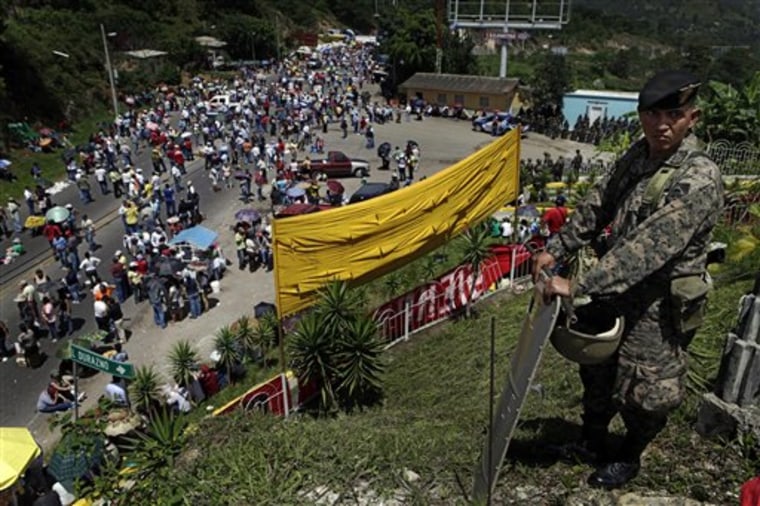Allies of Honduras' ousted President Manuel Zelaya say U.S.-backed talks in Costa Rica on Saturday may be the last chance to avert a clash, perhaps even civil war.
Zelaya is threatening to return to his homeland with or without an agreement on ending the standoff and has said Hondurans have a constitutional right to launch an insurrection against an illegitimate government.
In Washington, U.S. State Department spokesman P.J. Crowley called Friday for nations to support the talks that are being mediated by Costa Rican President Oscar Arias, who won the Nobel Peace Prize in 1987 for helping to end Central America's wars.
He also appeared to allude to remarks by Venezuelan President Hugo Chavez, a Zelaya ally who has called the negotiations a U.S.-backed trap and said on Friday: "In the next few hours, Zelaya will enter Honduras and we'll see what the guerillas are going to do" about it.
"No country in the region should encourage any action that would potentially increase the risk of violence either in Honduras or in surrounding countries," said Crowley, speaking to reporters in Washington.
Zelaya preparing to return
Interim President Roberto Micheletti has said Zelaya might try to sneak in by crossing Nicaragua's jungle-cloaked border with Honduras, but the ousted president apparently was still in Managua, Nicaragua's capital, on Friday.
Zelaya told Venezuelan state television late Thursday that the weekend talks hold out a moment of hope for a solution, but he was still readying for a return.
"I am preparing various alternatives: by air, by land, and others," he said.
In Honduras, meanwhile, about 2,000 Zelaya supporters blocked two highways connecting Tegucigalpa to the Caribbean and Pacific coasts for several hours Friday.
Some U.S. flights suspended
American Airlines temporarily suspended its two daily U.S. flights to the capital because of the political crisis, airline spokeswoman Berna Osorto said. Continental and Delta were continuing their flights.
Arias has presented a series of possible compromises to both camps, but indicated a power-sharing deal in which Zelaya could return to serve out the remaining months of his term with limited power would dominate the talks.
Arias said discussions also will cover possible amnesty for Zelaya.
The Supreme Court issued an arrest warrant for Zelaya before the coup, ruling his effort to hold a referendum on whether to form a constitutional assembly was illegal. The military decided to send him into exile instead on June 28 — a move that military lawyers themselves have called illegal but necessary.
Many Hondurans viewed the proposed referendum as an attempt by Zelaya to push for a socialist, Chavez-style model of governing.
Costa Rican president sees 'flexibility'
Arias said Friday both camps have "softened, and I think we are going to find more flexibility." In the first round of talks the two sides agreed only to meet again.
Micheletti told Colombia's RCN Radio that his government is open to dialogue but argues that Zelaya committed crimes against "the economy, the citizenry and against the constitution" and cannot be allowed to return to power.
He accused Zelaya of "calling for bloodshed."
Micheletti said he is willing to move up the elections as a way out of the crisis. The congressional president, sworn in to replace Zelaya, also said he would resign "if Mr. Zelaya stops inciting a revolutionary movement in the country and stops trying to return here."
If no agreement is reached, Zelaya's foreign minister Patricia Rodas has said he would return to Honduras to install a parallel government "to direct what I will call the final battle." She did not elaborate.
Zelaya's Sunday deadline for the coup leaders to back down falls on the 30th anniversary of Nicaragua's July 19, 1979, Sandinista revolution that toppled dictator Anastasio Somoza.
U.S.-backed Contra rebels later used Honduras as a base to attack President Daniel Ortega's socialist Sandinista government.
Rumors abound in Honduras that arms are once again being sent in through Puerto Cortes, that Venezuelans and Nicaraguans are infiltrating groups in the country and that uprisings are being planned in two or three provinces, according to political analyst and columnist Juan Ramon Martinez.
Ortega called rumors of Nicaraguan infiltration "a total lie," and countered with reports that Honduran soldiers might try to disguise themselves as Nicaraguan troops to spark unrest.
